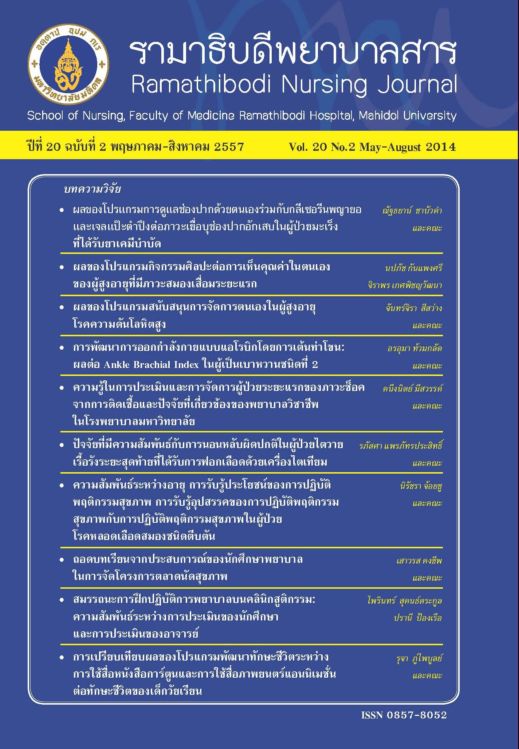การเปรียบเทียบผลของโปรแกรมพัฒนาทักษะชีวิตระหว่างการใช้สื่อหนังสือการ์ตูนและการใช้สื่อภาพยนตร์แอนนิเมชั่นต่อทักษะชีวิตของเด็กวัยเรียน
Main Article Content
Abstract
Abstract: The objective of this study was to examine the effects of Life Skill training program by comparing the outcomes of 2 types of media used: cartoon books and animation movies among school-agers. The program was developed under the Human Potential Development of The Faculty of Medicine Ramathibodi Hospital. Samples were students studying in 5th grade in a school. There were 3 groups, randomly assigned into the control group, the experimental group (books media), and the experimental group (animation media). The group size was between 44-48 students. The training consisted of 10 sessions with 50 minutes each. The instrument for evaluation of the program was life skill questionnaires for school-aged children, modified from Kaewpatima (2002). The study result showed that before the training, all three groups’ life skill scores were not differed. Post to the training, ANOVA and Post hoc analysis using Sheffe’s test revealed that the animation media group had a significant higher life skill score that the control group. But there was no significant different among the cartoon book media and the control group.
Keywords: life skill, school age, cartoon, book, movie, animation
Article Details
บทความ ข้อมูล เนื้อหา รูปภาพ ฯลฯ ที่ได้รับการตีพิมพ์ในรามาธิบดีพยาบาลสาร ถือเป็นลิขสิทธิ์ของวารสาร หากบุคคลหรือหน่วยงานใดต้องการนำทั้งหมดหรือส่วนหนึ่งส่วนใดไปเผยแพร่หรือเพื่อกระทำการใด ใด จะต้องได้รับอนุญาตเป็นลายลักษณ์อักษรจากรามาธิบดีพยาบาลสารก่อนเท่านั้น


